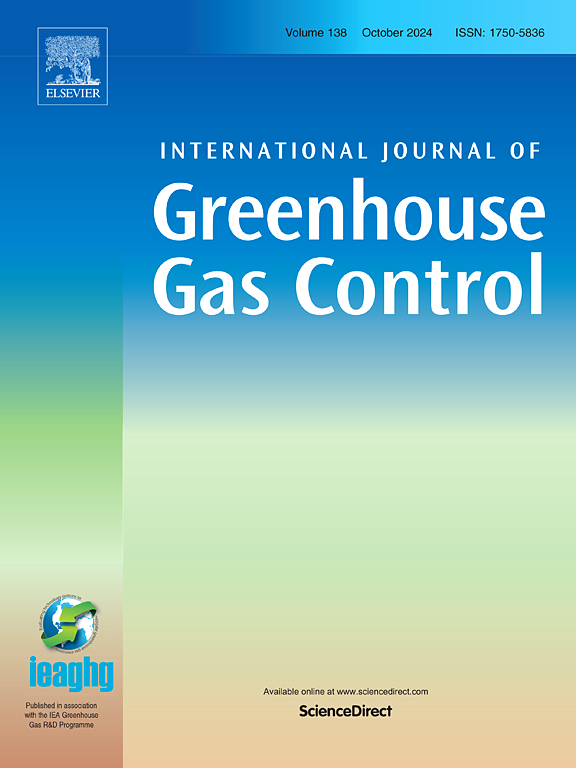通过水平井定期注入大规模二氧化碳封存中盐沉淀的模拟分析
IF 4.6
3区 工程技术
Q2 ENERGY & FUELS
International Journal of Greenhouse Gas Control
Pub Date : 2024-10-01
DOI:10.1016/j.ijggc.2024.104263
引用次数: 0
摘要
本模拟研究调查了在高水饱和度和不可忽略的残余油的近海枯竭油藏中进行二氧化碳封存时,水平注入器附近盐沉淀和地层破坏的新情况。基于之前的实验结果,我们的研究深入探讨了周期性二氧化碳注入过程中位移、蒸发和毛细管回流之间错综复杂的相互作用,这就需要在井筒附近进行精细网格划分(如细至 2 厘米),并对井筒区域进行等效表示,以准确捕捉盐沉淀动态。这项工作的一个主要贡献是根据射孔处的气体通量,识别并详细定量描述了三种不同的干燥机制--蒸发、毛细和粘性,这给储层模拟带来了独特的挑战。值得注意的是,我们的研究首次具体展示了单口二氧化碳注入井的这些干燥机制,为储层管理提供了重要的启示。研究结果凸显了毛细管机制对注入率损失的重大影响,并强调了细化井筒网格分辨率以降低潜在总堵塞风险的必要性。此外,这项研究还评估了注入温度和截留油的影响,揭示了它们对盐沉淀的抑制作用。重要的是,我们采用三维扇形模型探索了极端情况,如在毛细管系统内射孔完全堵塞,展示了气体流量的重新定向以保持注入率。总之,这项研究通过对干燥机制进行详细的定量评估,推动了该领域的发展,并强调了在有剩余油的复杂近海环境中,量身定制的模拟方法对于有效的储层管理至关重要。本文章由计算机程序翻译,如有差异,请以英文原文为准。
Simulation analysis of salt precipitation in large-scale CO2 storage using periodic injection via a horizontal well
This simulation study investigates the novel aspects of salt precipitation and formation damage near a horizontal injector during CO2 storage in an offshore depleted oil reservoir with high water saturation and non-negligible residual oil. Built upon prior experimental findings, our study delves into the intricate interplay between displacement, evaporation, and capillary backflow during periodic CO2 injection, necessitating fine gridding (e.g., down to 2 cm) near the wellbore and an equivalent representation of the wellbore area to capture salt precipitation dynamics accurately. A key contribution of this work is the identification and detailed quantitative characterization of three distinct drying regimes—evaporative, capillary, and viscous—based on gas flux at the perforation, which poses unique challenges in reservoir simulation. Notably, our study is the first to demonstrate these drying regimes specifically along a single CO2 injector well, providing critical insights for reservoir management. The results highlight the significant impact of the capillary regime on injectivity loss and underscore the necessity of refined wellbore grid resolution to mitigate potential total plugging risks. Furthermore, this work evaluates the effects of injection temperature and trapped oil, revealing their suppressive effects on salt precipitation. Importantly, employing a 3D sector model, we explore extreme scenarios such as complete perforation plugging within the capillary regime, showcasing redirection of gas flux to preserve injectivity. Overall, this study advances the field by offering detailed quantitative assessments of drying regimes and underscores the critical importance of tailored simulation approaches for effective reservoir management in complex offshore environments with residual oil.
求助全文
通过发布文献求助,成功后即可免费获取论文全文。
去求助
来源期刊
CiteScore
9.20
自引率
10.30%
发文量
199
审稿时长
4.8 months
期刊介绍:
The International Journal of Greenhouse Gas Control is a peer reviewed journal focusing on scientific and engineering developments in greenhouse gas control through capture and storage at large stationary emitters in the power sector and in other major resource, manufacturing and production industries. The Journal covers all greenhouse gas emissions within the power and industrial sectors, and comprises both technical and non-technical related literature in one volume. Original research, review and comments papers are included.

 求助内容:
求助内容: 应助结果提醒方式:
应助结果提醒方式:


